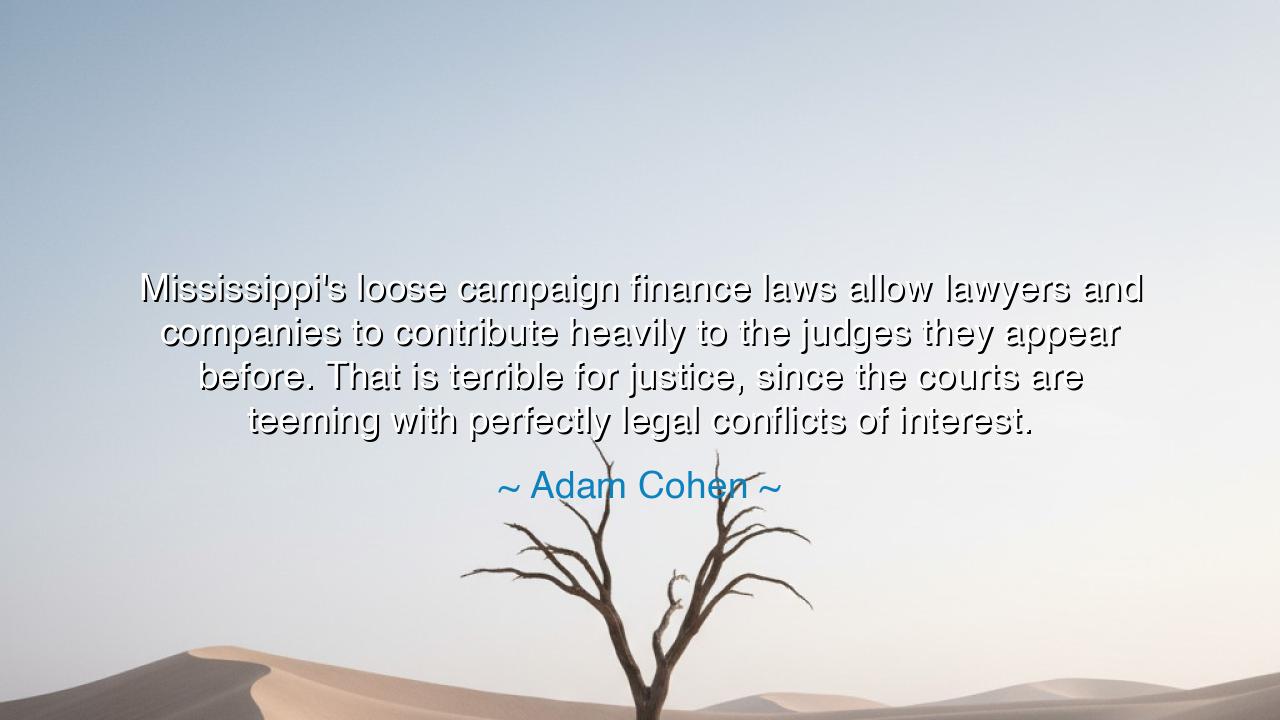
Mississippi's loose campaign finance laws allow lawyers and
Mississippi's loose campaign finance laws allow lawyers and companies to contribute heavily to the judges they appear before. That is terrible for justice, since the courts are teeming with perfectly legal conflicts of interest.






The words of Adam Cohen strike at the heart of justice itself: “Mississippi's loose campaign finance laws allow lawyers and companies to contribute heavily to the judges they appear before. That is terrible for justice, since the courts are teeming with perfectly legal conflicts of interest.” Within this statement lies a warning that echoes through the ages — that the law, when entangled with power and wealth, can become a tool not of fairness but of influence. Cohen exposes the tension between legality and morality, reminding us that what is lawful is not always just, and that the appearance of impartiality is as vital as the principle itself.
The origin of this reflection lies in the structure of Mississippi’s judicial system, where campaign financing for judicial elections is largely unrestricted. Lawyers and corporations who appear before these judges can make substantial contributions, creating relationships that, while legal, introduce conflicts of interest. Cohen highlights the danger of this arrangement: when those entrusted with interpreting the law are financially indebted to those they judge, public confidence erodes and the scales of justice tilt toward wealth and influence rather than truth and fairness.
From the perspective of the ancients, Cohen’s words resonate with lessons long understood. The philosophers of Athens and Rome warned that justice cannot thrive where wealth and favoritism dominate the courts. Cicero wrote that the strength of the republic rests on the integrity of the judiciary, for a society where judges are swayed by gifts or alliances becomes a society where law is mere theater. Cohen observes the same principle in modern America: when judges are beholden to contributors, the law no longer protects the people, but serves private interests.
History offers vivid illustrations of this peril. During the late Roman Republic, magistrates and consuls were often influenced by wealthy patrons, their rulings swayed by alliances rather than principle. Public confidence crumbled as citizens saw verdicts determined not by the merits of cases but by the power of influence. The courts, though functioning within the letter of the law, became instruments of partiality. Cohen’s statement mirrors this ancient warning, showing that legal permission does not absolve injustice.
Cohen also highlights the insidious nature of “perfectly legal conflicts of interest.” It is one thing to break the law; it is another to manipulate systems that appear legitimate. When judges receive campaign funds from parties who stand before them in court, the conflict exists not in violation of law but in the erosion of perceived impartiality. Public faith in the judiciary, once lost, is difficult to restore. The ancient Greeks understood that perception and reality together uphold justice: a verdict seen as corrupt undermines the very foundation of civic trust, regardless of legality.
Consider the modern implications: a corporation involved in litigation contributes heavily to a judge’s campaign. The case proceeds, and though the ruling may follow the law, citizens and litigants perceive influence. The court, as Cohen observes, becomes teeming with conflicts of interest, and the public witnesses justice compromised before the gavel even falls. The danger is not hypothetical; it undermines the integrity of society and the moral authority of the judiciary, echoing the fall of republics and empires whose legal systems were similarly compromised by favoritism and wealth.
The lesson is profound and enduring: the law must be insulated from the influence of wealth and power. Judicial independence is not a luxury, but the cornerstone of fair governance. Cohen’s words remind citizens and policymakers alike that ethics and structure must guide legality; a system that allows legal but corrosive conflicts invites decay. To protect justice, societies must regulate judicial financing, ensure transparency, and cultivate mechanisms that prioritize impartiality over patronage.
Thus, the words of Adam Cohen serve as both warning and guide. True justice requires more than laws on paper; it demands structures that preserve integrity, impartiality, and public trust. Wealth and influence must never overshadow truth and fairness, for a court compromised by conflict ceases to serve its people. To uphold the ideals of civilization, one must defend the independence of judges, scrutinize the channels of power, and ensure that justice remains blind — blind not only in letter but in practice, perception, and principle.






AAdministratorAdministrator
Welcome, honored guests. Please leave a comment, we will respond soon